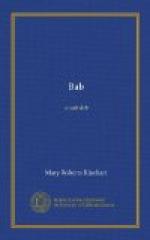“My dear child!” said father, looking surprised. “Such an outburst! All I was trying to say, before your mother comes down, is that I—well, that I understand and that I shall not make my little girl unhappy by—er—by breaking her Heart.”
“Just what do you mean by that, father?”
He looked rather uncomfortable, being one who hates to talk sentament.
“It’s like this, Barbara,” he said. “If you want to marry this young man—and you have made it very clear that you do—I am going to see that you do it. You are young, of course, but after all your dear mother was not much older than you are when I married her.”
“Father!” I cried, from an over-flowing heart.
“I have noticed that you are not happy, Barbara,” he said. “And I shall not thwart you, or allow you to be thwarted. In affairs of the Heart, you are to have your own way.”
“I want to tell you something!” I cried. “I will not be cast off! I——”
“Tut, tut,” said Father. “Who is casting you off? I tell you that I like the young man, and give you my blessing, or what is the present-day equivelent for it, and you look like a figure of Tradgedy!”
But I could endure no more. My own father had turned on me and was rending me, so to speak. With a breaking heart and streaming eyes I flew to my Chamber.
There, for hours I paced the floor.
Never, I determined, would I marry H. Better death, by far. He was a scheming Fortune-hunter, but to tell the family that was to confess all. And I would never confess. I would run away before I gave Sis such a chance at me. I would run away, but first I would kill Carter Brooks.
Yes, I was driven to thoughts of murder. It shows how the first false step leads down and down, to crime and even to death. Oh never, never, gentle reader, take that first False Step. Who knows to what it may lead!
“One false Step is never retreived.” Gray—On a Favorite Cat.
I reflected also on how the woman in the book had ruined her life with a letter. “The written word does not change,” she had said. “It remains always, embodying a dead truth and giving it apparent life.”
“Apparent life” was exactly what my letter had given to H. Frankenstein. That was what I called him, in my agony. I felt that if only I had never written the Letter there would have been no trouble. And another awful thought came to me: Was there an H after all? Could there be an H?
Once the French teacher had taken us to the theater in New York, and a woman sitting on a chair and covered with a sheet, had brought a man out of a perfectly empty Cabinet, by simply willing to do it. The Cabinet was empty, for four respectible looking men went up and examined it, and one even measured it with a Tape-measure.
She had materialised him, out of nothing.
And while I had had no Cabinet, there are many things in this world “that we do not dream of in our Philosophy.” Was H. a real person, or a creature of my disordered brain? In plain and simple language, could there be such A person?




